I’m not one to geek out over car parts, but when it comes to keeping your engine purring like a contented cat, a Bosch oil filter is a game-changer. Trust me, I’ve been through my share of oil changes, and Bosch has earned its spot in my garage.
This isn’t just a filter; it’s a shield for your engine, trapping grime and keeping things running smoothly. Whether you’re a weekend wrench-turner or just want your car to last, Bosch delivers quality you can feel.
Stick with me, and I’ll walk you through why this filter deserves your attention.
My Journey With Bosch Oil Filters
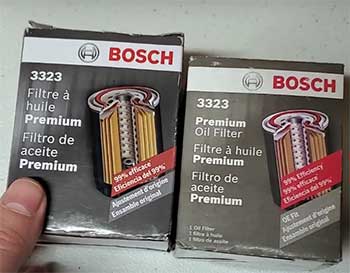
Picture this: it’s a sunny Saturday, and I’m elbow-deep in my garage, ready to tackle an oil change on my trusty 2015 Honda Civic.
I’d heard the buzz about Bosch oil filters, so I decided to give the Bosch 3323 Premium a shot.
The box boasted fancy terms like “FILTECH technology” and “99% efficiency,” but I wasn’t sold yet—marketing hype is everywhere, right?
Still, I popped it on, poured in some fresh synthetic oil, and fired up the engine.
The hum was smooth, no weird rattles or hiccups. That was the first clue I’d made a solid choice.
Over the next few months, I kept an eye on things. My Civic’s engine felt peppier, like it was breathing easier. I’m no mechanic, but I know when my car’s happy. After about 5,000 miles, I swapped out the filter during my next oil change and decided to get curious.
I sliced open the used Bosch filter (carefully, with a sturdy cutter) to see what was going on inside. The filter media was packed with trapped dirt and gunk—stuff that could’ve been grinding away at my engine.
The anti-drainback valve had held strong, keeping oil where it needed to be. Compared to the cheapo filters I’d used before, this was night and day. The canister was tough, no dents or leaks, and the gasket came off clean. I was impressed.
Since then, I’ve stuck with Bosch for my oil changes, trying models like the 3330 and Distance Plus. Each time, the installation was a breeze, and my engine kept its cool, even on long road trips.
I’ve put about 30,000 miles on my car with Bosch filters, and it’s still running like a dream. That’s not just luck—that’s a filter doing its job. My experience convinced me that Bosch isn’t just another brand; it’s a reliable partner for keeping my car’s heart beating strong.
What Makes Bosch Oil Filters Stand Out?
Bosch oil filters aren’t your average engine accessory—they’re built with a purpose. The brand’s reputation for quality stretches back decades, and their oil filters live up to the hype. What sets them apart is their focus on advanced filtration.
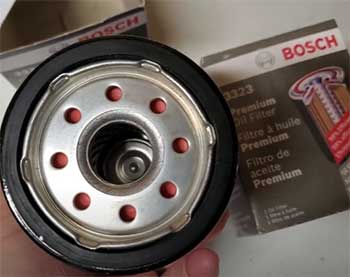
Their FILTECH media, a blend of natural and synthetic fibers, grabs contaminants like a magnet, from big chunks of debris to tiny particles that could wear down your engine over time.
I’ve seen the proof in my own filters after cutting them open.
The media holds up to 14 grams of dirt in some models, and the Distance Plus claims up to 29.1 grams—that’s a lot of grime not circulating through your engine.
Another thing I love is the durability.
The steel canisters are thick and built to handle high pressure, up to 500 psi in some cases, way more than most engines throw at them.
The silicone anti-drainback valve is a small but mighty feature, ensuring oil stays in the filter when your engine’s off, so you don’t get dry starts that can stress your engine. I’ve noticed my car starts smoother since switching to Bosch, especially on cold mornings.
Plus, the gaskets are designed for a tight seal but easy removal, which saves me from wrestling with stuck filters during oil changes.
Bosch also tailors their filters to specific vehicles, so whether you drive a compact sedan or a beefy truck, there’s a model that fits like a glove. I’ve used the 3323 on my Civic and the 3330 on my brother’s Toyota, and both were spot-on.
The brand’s attention to detail, from the spiral-wound center tube to the high-flow relief valve, shows they’re not cutting corners. It’s the kind of engineering that makes you feel confident your engine’s in good hands.
Pros of Bosch Oil Filters
- Superior Filtration Power
Let’s talk about what really matters: keeping your engine clean. Bosch oil filters shine here with their FILTECH media, which traps up to 99% of contaminants in standard models and 99.9% in the Distance Plus.
I’ve cut open used filters and seen the gunk they catch—metal flakes, carbon, and other nasty stuff that could chew up your engine. This isn’t just about immediate performance; it’s about extending your engine’s life.
My Civic’s still humming at 150,000 miles, and I credit Bosch for catching the junk before it causes trouble.
- Built Like a Tank
Durability is where Bosch flexes its muscles. The steel canisters are thicker than most, and I’ve never seen one dent or leak, even after months of use. The double-rolled seam and metal end caps add to the sturdiness, making these filters feel like they could survive a war zone.
I’ve had cheaper filters crumple under pressure (literally), but Bosch holds up. The silicone gaskets are another win—they seal tight but don’t stick when it’s time to swap them out, saving you from cursing in your driveway.
- Easy Installation and Compatibility
If you’re like me and do your own oil changes, you’ll appreciate how user-friendly Bosch filters are. The threading is precise, so they screw on smoothly, and the high-lubricity gasket makes removal a breeze.
I’ve never had to fight a Bosch filter off, unlike some bargain brands that seem welded on. Bosch also makes filters for a wide range of vehicles, so you’re likely to find one that fits your car perfectly. I’ve used them on Hondas, Toyotas, and even a friend’s Jeep with zero issues.
- Long-Lasting Performance
Bosch filters are built to go the distance, especially if you’re using synthetic oil. The larger filter area—42% bigger than some competitors—means they can handle extended oil change intervals, up to 10,000 miles or more with models like the Distance Plus.
I’ve pushed my filters to 7,500 miles with synthetic oil, and they still looked solid when I replaced them. This longevity saves you money and hassle in the long run, which is a big plus for anyone who hates frequent maintenance.
Cons of Bosch Oil Filters
- Higher Price Tag
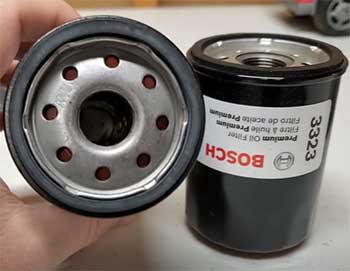
Let’s be real—Bosch filters aren’t the cheapest option out there.
They typically run between $6 and $20, depending on the model and where you shop, while you can snag a budget filter for $2 or $3.
I felt the sting when I first bought a Bosch 3323 for $8, compared to the $3 Supertech I’d used before.
But after seeing the quality and performance, I realized you get what you pay for.
If you’re on a tight budget, the upfront cost might make you hesitate, but I’d argue it’s worth it for the engine protection.
- Mixed Reviews on Manufacturing
I’ve read some grumbling online about Bosch filters not being made in Germany anymore, with production shifting to places like Mexico or Vietnam. Some users claim the quality dipped after the switch, citing thinner canisters or less reliable valves.
I haven’t noticed any drop-off in my filters, but it’s worth noting if you’re a stickler for “made in Germany” branding. Bosch contracts with companies like Purolator or Mann+Hummel, which can lead to slight variations. It’s not a dealbreaker for me, but it’s something to keep in mind.
- Not Always Necessary for Basic Use
If you drive an older car with looser engine tolerances or stick to short oil change intervals (like 3,000 miles), you might not need a premium filter like Bosch. I’ve got a friend who runs a 90s Chevy with cheap filters and swears it’s fine.
For basic driving and frequent oil changes, a budget filter might do the job. Bosch’s advanced features shine more in modern engines or high-performance setups, so if your car’s a beater, you might not see the full benefit.
Maintenance Tips For Bosch Oil Filters
- Choose the Right Filter for Your Vehicle
Picking the correct Bosch filter is step one. Check your car’s manual or use an online parts finder to match the model number (like 3323 or 3330) to your make and model. I learned this the hard way when I almost bought the wrong filter for my Civic—double-check to avoid headaches.
Bosch’s website or retailers like Amazon have compatibility tools, so use them. A mismatched filter can cause leaks or poor filtration, so take the extra minute to get it right.
- Change Filters with Every Oil Change
I always swap my Bosch filter when I change my oil, usually every 5,000 to 7,500 miles with synthetic. Even though some filters can technically last longer, replacing them ensures maximum performance.
I’ve seen what a clogged filter looks like—trust me, you don’t want that gunk sitting in your engine. If you’re using conventional oil, stick to shorter intervals (3,000–5,000 miles). A fresh filter keeps your oil clean and your engine happy.
- Inspect the Filter During Installation
Before screwing on a new Bosch filter, give it a quick once-over. Check the gasket for defects and make sure it’s lubricated (Bosch pre-lubes theirs, but a dab of oil doesn’t hurt). I also peek inside to ensure the threading looks clean.
Once, I found a tiny dent in a filter’s canister—not a Bosch, thankfully—and swapped it out. A quick inspection can save you from leaks or pressure issues down the road.
- Use Quality Oil
A great filter like Bosch deserves great oil. I pair mine with full-synthetic oil to maximize engine protection. Synthetic oils last longer and flow better, complementing the filter’s high capacity.
I’ve tried brands like Mobil 1 and Pennzoil Ultra Platinum with Bosch filters, and the combo keeps my engine smooth. Avoid bargain-basement oils—they can break down faster and clog your filter, undoing all that filtration goodness.
- Monitor Your Engine’s Performance
After installing a Bosch filter, keep an ear out for how your engine sounds and feels. I noticed my Civic started quieter and ran smoother after switching to Bosch. If you hear odd noises or see warning lights, double-check the filter’s installation or look for leaks.
Regular oil level checks are a must, too. I pop my hood every couple of weeks to make sure everything’s in order—it’s a small habit that catches issues early.
Comparison of Bosch Oil Filter With Other Brands
- Purolator Boss
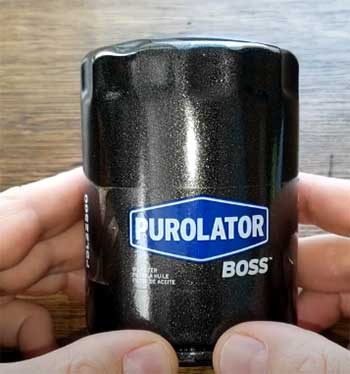
Purolator’s Boss line is a heavy hitter, often praised for top-notch filtration.
I’ve used their filters before, and they’re solid, catching fine particles (21–70 microns) better than most in tests.
The double-helix center tube and silicone anti-drainback valve are similar to Bosch, ensuring good flow and no dry starts.
However, Purolator Boss filters are pricier, often $10–$15, and I’ve found their gaskets stickier during removal compared to Bosch’s slick design.
If filtration is your top priority, Purolator’s a strong contender, but Bosch balances performance and ease of use better for me.
- K&N Performance Gold
K&N’s Performance Gold filters are built for high-performance cars, prioritizing oil flow over filtration. I tried one on a friend’s tuned Mustang, and it delivered smooth oil delivery, perfect for high-revving engines.
The welded nut makes removal a cinch, but the filtration efficiency (around 97%) lags behind Bosch’s 99%. K&N’s thicker canisters are tough, but at $12–$20, they’re not cheap. For everyday driving, I stick with Bosch—it’s overkill for my Civic to sacrifice filtration for flow, but K&N’s a go-to for performance junkies.
- Mobil 1 Extended Performance
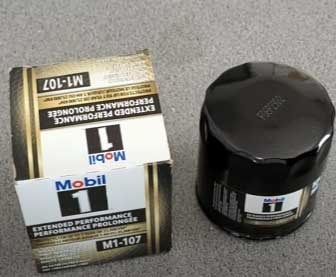
Mobil 1 filters are a favorite for synthetic oil users, and I’ve used them alongside their oils.
They boast 99.6% efficiency and a synthetic fiber media that holds up to 28 grams of dirt, close to Bosch’s Distance Plus.
The build quality is excellent, with sturdy canisters and reliable valves.
However, they’re often $10–$15, and I’ve had mixed experiences with gasket removal—some were a pain to unscrew.
Bosch edges out for me with easier installation and a slightly lower price, but Mobil 1’s a close second for long oil change intervals.
- Wix XP
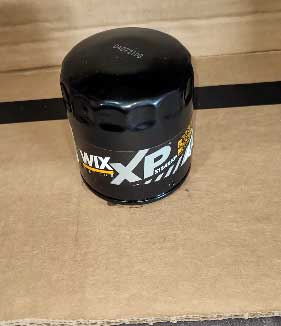
Wix XP filters are known for their durability and high-flow design, great for tough conditions like off-roading.
I used one on a buddy’s Jeep, and it held up through dusty trails.
The wire-backed media catches 98–99% of contaminants, and the canister feels as tough as Bosch’s.
At $8–$12, they’re competitively priced, but I’ve read about occasional quality control issues, like loose threading.
Bosch feels more consistent, and its larger filter area gives me extra confidence for extended use, but Wix is a solid pick for rugged driving.
- Fram Ultra Synthetic
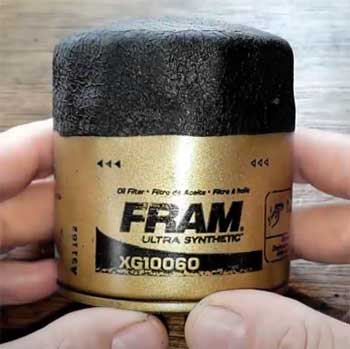
Fram’s Ultra Synthetic filters have come a long way from their budget roots, offering 99% efficiency and a synthetic media that rivals Bosch.
I gave one a try, and it performed well, holding plenty of dirt.
The textured grip is handy, but at $9–$14, it’s not much cheaper than Bosch, and I’ve heard mixed reviews about long-term durability.
Bosch’s thicker canister and silicone valve feel more premium, and I trust them more for my daily driver.
Fram’s a decent alternative, but Bosch wins for overall reliability.
Frequently Asked Questions (FAQ)
Absolutely, Bosch engine filters are among the best you can get. I’ve used them for years, and their FILTECH media catches nearly all contaminants, with some models hitting 99.9% efficiency. The sturdy build and silicone anti-drainback valve keep your engine protected and starting smoothly. While they’re pricier than budget options, the performance and peace of mind are worth it. My Civic’s engine has stayed healthy through 30,000 miles with Bosch, and I’ve seen the gunk they trap firsthand—proof they’re doing the job right.
Picking the “best” oil filter brand depends on your needs, but Bosch is my top choice for its balance of filtration, durability, and value. Purolator Boss excels at catching fine particles, while K&N Performance Gold is ideal for high-performance cars needing strong oil flow. Mobil 1 and Wix XP are also excellent, especially for synthetic oil or tough conditions. I lean toward Bosch for everyday driving because it’s reliable, easy to install, and keeps my engine clean without breaking the bank.
Bosch doesn’t always manufacture its own filters; they often partner with companies like Purolator or Mann+Hummel. This caused some buzz when I learned it, as I assumed Bosch handled everything in-house. These partners use Bosch’s specs and FILTECH technology, so the quality stays high. I’ve used filters from different production runs and haven’t noticed a difference in performance. The collaboration lets Bosch focus on design while leveraging expert manufacturing, which seems to work given the filters’ consistent reliability.
Not always. While Bosch is a German company, many of their oil filters are now made in places like Mexico, Vietnam, or the U.S. through partnerships with manufacturers like Purolator. I was surprised at first, expecting that “German engineering” stamp, but the filters I’ve used still meet Bosch’s high standards. Some folks online complain about non-German production, but I haven’t seen any quality issues in my experience. The design and tech are what matter, and Bosch delivers there regardless of the factory.
Wrapping It Up: Why Bosch Is Your Engine’s Best Friend?
After countless oil changes and miles on the road, I’m sold on Bosch oil filters. They’re not just a purchase; they’re an investment in your car’s longevity. From their top-tier filtration to their rock-solid build, Bosch filters give you confidence that your engine’s protected.
Sure, they cost a bit more, but the peace of mind and performance are worth every penny. Grab a Bosch filter for your next oil change—you’ll feel the difference, and your engine will thank you.
Trust me, it’s a small choice that makes a big impact.

